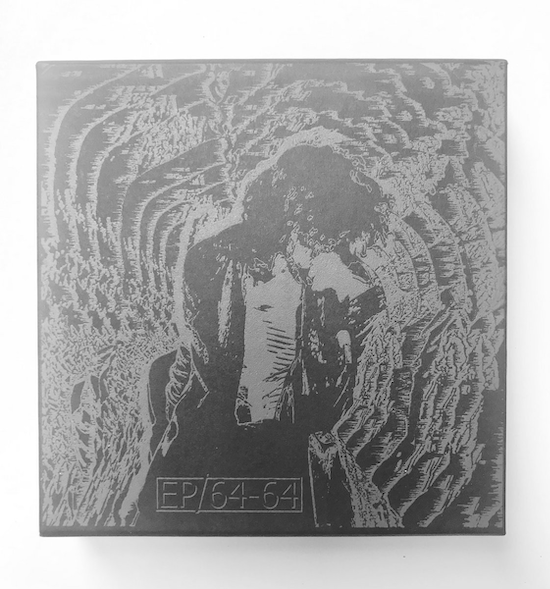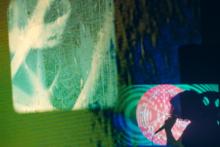In the early 2010s, vocalist Dali De Saint Paul had a dream about visiting the record shop RISE in her home city of Bristol. The shop assistant explained that if she was looking for records by her own band EP/64, she wouldn’t find any: the project was over at her own insistence, and there were no records left. While De Saint Paul did not yet have a band called EP/64, this prompted her to form one in 2016: interpreting ‘EP’ as an acronym for ‘Ephemeral Project’, and ‘64’ as the number of gigs it would play before stopping.
Over the next six years, EP/64’s wild improvisational shows established it amongst Bristol’s most vital experimental projects. Sets featured De Saint Paul with a shifting cast of collaborators, hailing from techno, noise, punk, free jazz and the visual arts. The 64th and final event, held last summer at the Arnolfini Gallery, was a suitably explosive send-off. Over 35 musicians convened for a weekend-long blowout, comprising 14 improvised performances.
The sets from this grand finale are finally being released as the CD boxset EP/64-64, issued by TBC Editions: a label run by affiliates of Bristol’s now-defunct Brunswick Club. It is a dazzling collection, featuring collaborative sets by members of Giant Swan, Viridian Ensemble, Young Echo and GNOD alongside the likes of Agathe Max, Ben Vince and MXLX. Split across six CDs, its tracks mostly range in length from 25-40 minutes, covering sounds ranging from post-rock to industrial techno. Beyond the musical thrills EP/64-64 has to offer, however, the project also prompts interesting questions about improvised music itself.
It is eerie, even by the standards of a band conceived in a dream, that EP/64 reached its long-prophesised conclusion just two months before one of its forebearers: the seminal free improvisation group AMM. Founded in 1965, this project was similarly helmed through various line-ups by one musician: the percussionist Eddie Prévost. Moreover, a recording of AMM’s final performance was finally made public (via Stewart Morgan Hajdukiewicz’s film A Bright Nowhere) within a few days of EP/64-64’s announcement.
Clearly, the universe is insisting we draw some conclusions by comparing these projects. One concerns the fact that AMM, despite its self-renewal through various line-up changes, was ultimately forced to end by circumstances beyond its control: Prévost noted the declining health of longstanding member John Tilbury, who was too ill to attend the final show. De Saint Paul founded EP/64 not only accepting it would have to end, but celebrating this. In establishing the constraint of 64 shows (no more arbitrary than that of a 40-minute set), EP/64 pointed to a truth of improvised music: while it gestures towards open-ended play, its priority is immediate, fleeting experience.
This comparison with AMM, active for almost 10 times EP/64’s six-year history, also underscores the scale of EP/64’s achievement as a collaborative project. Across just 64 gigs, which many touring bands will comfortably knock out this summer, De Saint Paul managed to recruit over 50 collaborators from far-ranging disciplines. These were often informal affairs: when EP/64 were first joined onstage by saxophonist Ben Vince to support Keiji Haino and Charles Hayward, they had supposedly barely been introduced. Vince would become a fixture of EP/64, performing in two sets on EP/64-64. Speaking to me recently, De Saint Paul claimed there was a political weight to collaborating with strangers: “You manage to accept what they are bringing to the community.”
Considered differently, EP/64’s six years represent a vast stretch of time. The project outlived the record shop where De Saint Paul’s dream took place, The Brunswick Club, and another event at the Arnolfini: Howling Owl Records’ annual experimental festival New Year: New Noise, which previously hosted several contributors to EP/64-64.
Six years feels longest when measured in the headlines of music publications – several of which EP/64 has also outlived. When EP/64 formed in 2016, the rise of Spotify was still newsworthy. The project’s lifetime has seen the conversation shift to the impact of Brexit on touring musicians, myriad issues around the pandemic, and finally the controversial rise of AI. While these have been six years of turbulence for conventional UK bands, we are prompted to consider how different (if not necessarily brighter) they may have looked to EP/64: a project already living in constant flux, fluid in its membership, unhampered by the rigidities of release campaigns or necessities of touring, and certain (rather than fearful) of its own demise.
This history is felt in EP/64-64, not least in an apparent call-back to their last show before the first national lockdown. Performed in an old set of underground jail cells called The Island, their 57th set featured De Saint Paul alongside Vince and drummer Dan Johnson. This formed one of their few releases, as the limited cassette EP/64-57 on local crew-label Avon Terror Corps. In one performance on EP/64-64, Vince and Johnson return with the addition of GNOD’s Jesse Webb and noise artist Silver Waves: the headliner of that last pre-lockdown show. The two drummers drive a muscular, nightmarishly hypnotic performance, as Vince’s reverb-drenched squalls fence with Silver Waves’ piercing, lurching electronics.
This is one of many tracks on EP/64-64 in which De Saint Paul herself is absent. Where she does appear, processing her wild improvised vocals through a range of effects, her performances are astonishing. She leads the opening piece with loops of sibilant whispers, animalistic woops and frenzied screaming: directing Johnson, Kelan, COIMS and Axiom Zone through blistering peaks and chilling free-jazz sections. Joined elsewhere by Wojciech Rusin, Melanie Clifford and Miguel Prado (who also performs with De Saint Paul in the superb noise duo HARRGA), her use of dramatic, sustained croons is darkly beautiful.
The contrast between these two tracks underscores EP/64-64’s extraordinary musical breadth. We might expect as much given the great sweep of disciplines and genres represented by its members, which range from violinist Agathe Max to noise producer MXLX. Notably, these two contrasting artists are both among the project’s seasoned improvisers, who EP/64-64 places in conversation with artists known for more deliberately arranged music. Strange matchups include putting Vince onstage with Young Echo members Guest and Ossia, associated with more considered forms of experimentation. However, the mix of Vince’s dramatic squalls, Guest’s breathy vocal performances and Ossia’s noirish dub beats proves electrifying.
While EP/64-64’s improvisational matchups yield plenty of surprises like this, the selection and ordering of them represents an act of formal organisation. While the performers intuit the structure and endings of these sets, De Saint Paul had to decide – for example – who would appear for the ‘big finish’. While earlier tracks fill the stage with as many as seven performers, the final performance is a trio: De Saint Paul, Johnson, and Giant Swan’s Robin Stewart.
This is an explosive performance, and possibly the boxset’s finest. De Saint Paul opens by spinning together one of her signature creations: a shifting mass of pitch-shifted vocal loops. Johnson picks this up with a breakneck drumming performance, reaching speeds that – even when foregrounded by the metal sensibilities of earlier moments on the record – become genuinely difficult to visualise. This trades off to Stewart’s palette of acid synths, industrial percussion and lurching bass, which then does the driving: Johnson is freed to produce a cornucopia of beats and fills, while De Saint Paul explores looser, wilder territory. As Stewart introduces an up-tempo bass synth line, De Saint Paul and Johnson momentarily drop out: we hear applause and ecstatic screaming from the audience, recognising they are about to enter the ‘final act’. Johnson rejoins with an electrifying tom-led beat, punctuated by De Saint Paul’s looped screams. The ending comes in the form of a rising drone, reminiscent of Giant Swan’s signature closers, climbing through a barrage of looped yelps and blast beats. “Oh my God!” we hear one punter cry, amidst nearly two full minutes of applause.
EP/64-64 is not only a thrilling body of experimental music, or a document of a fascinating improvisational project. The scale and variety of this boxset, as well as the questions EP/64 raises, speak to the mysterious draw of improvised music itself. We hear artists from far-ranging backgrounds come together, and spend a finite time trying to get the best out of each other. The strange creations they produce sparkle with unlikely triumphs and flashes of genius.



